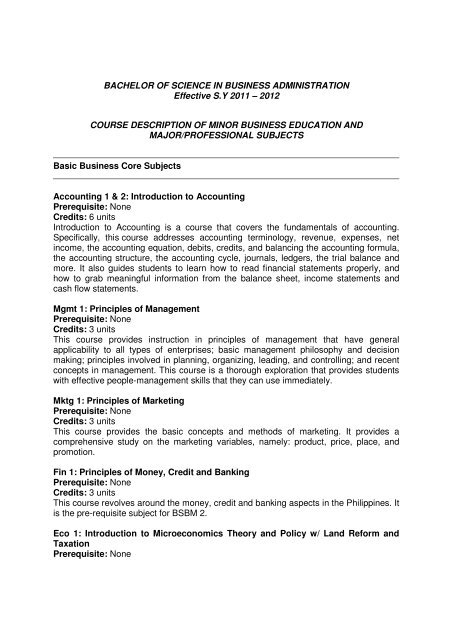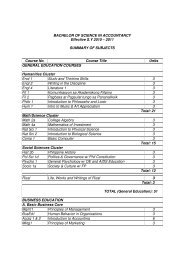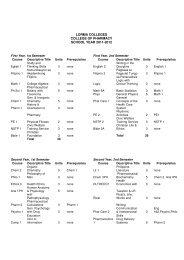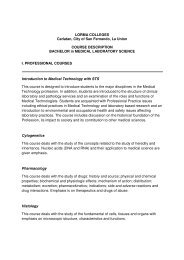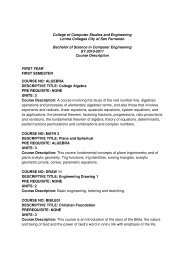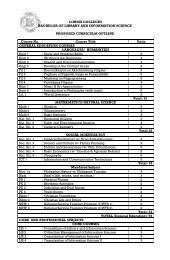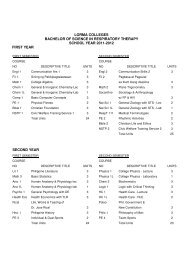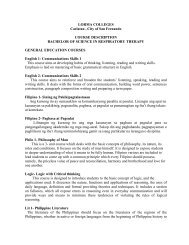Download the Course Description - Lorma Colleges
Download the Course Description - Lorma Colleges
Download the Course Description - Lorma Colleges
You also want an ePaper? Increase the reach of your titles
YUMPU automatically turns print PDFs into web optimized ePapers that Google loves.
BACHELOR OF SCIENCE IN BUSINESS ADMINISTRATIONEffective S.Y 2011 – 2012COURSE DESCRIPTION OF MINOR BUSINESS EDUCATION ANDMAJOR/PROFESSIONAL SUBJECTSBasic Business Core SubjectsAccounting 1 & 2: Introduction to AccountingPrerequisite: NoneCredits: 6 unitsIntroduction to Accounting is a course that covers <strong>the</strong> fundamentals of accounting.Specifically, this course addresses accounting terminology, revenue, expenses, netincome, <strong>the</strong> accounting equation, debits, credits, and balancing <strong>the</strong> accounting formula,<strong>the</strong> accounting structure, <strong>the</strong> accounting cycle, journals, ledgers, <strong>the</strong> trial balance andmore. It also guides students to learn how to read financial statements properly, andhow to grab meaningful information from <strong>the</strong> balance sheet, income statements andcash flow statements.Mgmt 1: Principles of ManagementPrerequisite: NoneCredits: 3 unitsThis course provides instruction in principles of management that have generalapplicability to all types of enterprises; basic management philosophy and decisionmaking; principles involved in planning, organizing, leading, and controlling; and recentconcepts in management. This course is a thorough exploration that provides studentswith effective people-management skills that <strong>the</strong>y can use immediately.Mktg 1: Principles of MarketingPrerequisite: NoneCredits: 3 unitsThis course provides <strong>the</strong> basic concepts and methods of marketing. It provides acomprehensive study on <strong>the</strong> marketing variables, namely: product, price, place, andpromotion.Fin 1: Principles of Money, Credit and BankingPrerequisite: NoneCredits: 3 unitsThis course revolves around <strong>the</strong> money, credit and banking aspects in <strong>the</strong> Philippines. Itis <strong>the</strong> pre-requisite subject for BSBM 2.Eco 1: Introduction to Microeconomics Theory and Policy w/ Land Reform andTaxationPrerequisite: None
Credits: 3 unitsThis course deals with <strong>the</strong> study of <strong>the</strong> behavior of individual economic units. It studieshow industries and market operate and evolve, why <strong>the</strong>y differ from one ano<strong>the</strong>r, andhow <strong>the</strong>y are affected by government policies and global economic conditions. Itspecifically deals with <strong>the</strong> concepts of supply and demand in <strong>the</strong> market, consumerbehavior, production and cost, and competition. It also presents a study on <strong>the</strong> basicprinciples of economics. The latter part of <strong>the</strong> course will be focused on Taxation, LandReform and Comprehensive Agrarian reform.TQM: Total Quality ManagementPrerequisite: NoneCredits: 3 unitsThe total quality management (TQM) course is a component of Quality Assurance thattries to integrate quality practices into every phase of production. This QualityAssurances course affects many industries, from creative design to manufacturing. TheTQM course also covers tools that help to constantly evaluate and improve QualityAssurance within a production environment. It includes <strong>the</strong> concept/terminology of TQM,Vision and Reality-Bridging <strong>the</strong> Gap, Seeking Practical Feedback for supervisors andContinuing Improvement.Business Education CoreEco 2: Introduction to MacroeconomicsPrerequisite: Econ. 1Credits: 3 unitsThis course deals with <strong>the</strong> study of <strong>the</strong> economy in <strong>the</strong> aggregate. It examines howeconomic agents as a whole respond to changes in <strong>the</strong> economic environment. It alsostudies how <strong>the</strong>ir actions feedback on <strong>the</strong> economy. It specifically deals with <strong>the</strong> studyof Gross Domestic Product (GDP), GDP growth rate, Gross National Product, InflationRates, Unemployment rates, Aggregate supply and demand, Fiscal Policies and MoneySupply determination.Accounting 3 & 4: Partnership and CorporationPrerequisite: Accounting 1 and 2Credits: 6 unitsThis course is a continuation of Accounting 1 & 2 and covers accounting forcorporations and partnerships. It also provides an introduction to managerialaccounting. Accounting 1 & 2 is a prerequisite for taking this course.Tax 1: Income TaxesPrerequisite: Basic Business Core SubjectsCredits: 3 units
This introductory tax course is primarily concerned with income taxation. It involvesbasic principles and rules of <strong>the</strong> income tax system as <strong>the</strong>y apply to individual,partnership, corporation and trust. The course emphasizes <strong>the</strong> concepts of filingrequirements, <strong>the</strong> determination of and adjustments to gross income, personal andbusiness deductions and business income. Some of <strong>the</strong> basic elements of corporatetaxation will be introduced.Tax 2: Business Taxes & O<strong>the</strong>r TaxesPrerequisite: Tax 1Credits: 3 unitsAn in-depth study of corporate taxation. Topics include estate tax, donor’s tax, valueaddedtax, o<strong>the</strong>r percentage taxes and tax administration and procedure (in nationaltaxation). Tax 1 is a pre-requisite of this course.Law 1: Obligations and ContractsPrerequisite: NoneCredits: 3 unitsThis unit includes <strong>the</strong> discussions of <strong>the</strong> basic principles in obligations and contractsformulation. Discussion will center more on laws included in business management.Law 2: Law on Negotiable InstrumentsPrerequisite: Law 1Credits: 3 unitsThis course covers fundamentals of laws concerning <strong>the</strong> formation and <strong>the</strong> performanceof contracts, sale of goods transactions, creation and <strong>the</strong> transfer of negotiableinstruments, and selected transactions in real and personal property.Major/Professional Subjects for Major in Human Resource Management andDevelopmentBAHRD 1: Business & Professional CommunicationPrerequisite: Basic Business Core SubjectsCredits: 3 unitsThis unit includes <strong>the</strong> principles and roles of business communication and <strong>the</strong> need forcommunication skills in global market. Emphasis on written communications such asstandard and persuasive business letters memorandum, informational as well asanalytic reports. Studies effective proposals, resumes, and o<strong>the</strong>r employment-relateddocuments. Develop professional planning, organizing, and outlining skills as well asediting proficiency.BAHRD 2: Administrative Office ManagementPrerequisite: Basic Business Core SubjectsCredits: 3 units
This course is a study of <strong>the</strong> different phases of administrative office management andits vital role in <strong>the</strong> business organization. It also includes <strong>the</strong> importance of AOM onmanagement, technology, management’s decision making and <strong>the</strong> need for goodplanning toward job satisfaction and self-actualization. It covers topics like <strong>the</strong> basicconcepts of AOM, managing a culturally diverse workforce, managing administrativeservices, and controlling administrative services.BAHRD 3: Labor Law and LegislationPrerequisite: Basic Business Core SubjectsCredits: 3 unitsThe course covers <strong>the</strong> introduction to <strong>the</strong> basic concepts and principles of <strong>the</strong> PhilippineLabor Code as an indispensable tool in human resource management. Knowing <strong>the</strong>various labor and social legislation is as indispensable as knowing <strong>the</strong> basic laws of <strong>the</strong>land. The scope will also cover <strong>the</strong> different government instrumentalities involved inimplementing labor and social legislations like <strong>the</strong> Department of Labor, National LaborRelations Commission, <strong>the</strong> Social Security System, etc The student is given <strong>the</strong>opportunity to learn how <strong>the</strong> various labor laws affect <strong>the</strong> manner business operates,<strong>the</strong> interplay of various sectors, <strong>the</strong> limitations and scope of freedom in <strong>the</strong> workplacewill influence <strong>the</strong> culture of <strong>the</strong> organization.BAHRD 4: Production & Operations ManagementPrerequisite: Basic Business Core SubjectsCredits: 3 unitsThis course is a survey of <strong>the</strong> fundamental concepts of production & operationsmanagement, and <strong>the</strong> use of quantitative methods and computer application forforecasting, resource allocation, decision <strong>the</strong>ory, capacity planning, projectmanagement, inventory management and quality assurance.BAHRD 5: Recruitment and SelectionPrerequisite: Basic Business Core SubjectsCredits: 3 unitsThis course covers <strong>the</strong> fundamental methodologies of attracting new talents needed by<strong>the</strong> organization with emphasis on effective sourcing of manpower, selection ofprospective employees, matching job requirements with qualifications of applicants in<strong>the</strong> work place, induction of newly hired employees to facilitate <strong>the</strong>ir integration in <strong>the</strong>new business environment. The students will be oriented with <strong>the</strong> strategies andtechniques to fill up vacant positions at <strong>the</strong> right time with adequate qualifications of newhires will help organizations achieve its business plans and operational objectives for agiven period.BAHRD 6: Human Behavior in OrganizationPrerequisite: BAHRD 1 - BAHRD5Credits: 3 unitsThis course studies <strong>the</strong> various types of organizational structures, both formal andinformal, with special emphasis on <strong>the</strong> behavior of people within those structures.Topics include organizational communication, worker motivation, leadership, employee
attitudes, team dynamics, organizational change & cultural perspectives in <strong>the</strong>workplace.BAHRD 7: Strategic Human Resource ManagementPrerequisite: BAHRD 1 - BAHRD5Credits: 3 unitsThis course will allow students to work with a seasoned and capable mentor who willguide <strong>the</strong> students in <strong>the</strong>ir self-discovery. The philosophy on <strong>the</strong> self as <strong>the</strong> primaryinstrument and a key success factor in effectively performing strategic HR work will be<strong>the</strong> cornerstone of this course. Various self-assessment tools and instrumentation willbe utilized to enhance self-understanding/processing.BAHRD 8: Entrepreneurial ManagementPrerequisite: BAHRD 1 to BAHRD 5Credits: 3 unitsThe course aims to teach <strong>the</strong> approach of entrepreneurs used in identifying opportunityand creating new ventures; <strong>the</strong> analytical skills that are needed to practice thisapproach; and <strong>the</strong> background knowledge and managerial skills that are necessary fordealing with <strong>the</strong> recurring issues involved in starting, growing, and harnessing <strong>the</strong> valueof new ventures.BAHRD 9: Training and DevelopmentPrerequisite: BAHRD 1 - BAHRD5Credits: 3 unitsThe course discusses training as related to organizational objects. Training models,learning <strong>the</strong>ory, evaluation methodologies, instructional techniques and topics of specialinterest are emphasizedBAHRD 10: Compensation AdministrationPrerequisite: BAHRD 1 - BAHRD5Credits: 3 unitsThe course includes examination of <strong>the</strong>ories, models and procedures required todevelop compensation and reward systems in organizations. Economic, psychologicaland social elements of compensation. Determination of compensation structures anddifferentials, forms of compensation and reward, compensation levels.BAHRD 11: Labor Relations and NegotiationsPrerequisite: BAHRD 1 to BAHRD 5Credits: 3 unitsThe course uses cases, lectures and simulations to develop negotiation skills in avariety of management situations, including union-management relations. Issuesinclude preemployment discussions, collective bargaining, arbitration, mediation,agency, renegotiating contracts, and multiparty discussions.BAHRD 12: Marketing ManagementPrerequisite: BAHRD 6 to BAHRD 11
Credits: 3 unitsThis course aims to provide students with a thorough understanding of <strong>the</strong> role ofmarketing management in <strong>the</strong> society, <strong>the</strong> economy and <strong>the</strong> firm. It deals with <strong>the</strong>marketing strategies of management. Case analyzes are used to encourage creativethinking, decisionmakingand policy formulation among students.BAHRD 13: Practicum I (On-<strong>the</strong>-Job Training)Prerequisite: BAHRD 6 to BAHRD 11Credits: 5 unitsA course of study designed especially for <strong>the</strong> supervised practical application ofpreviously studied <strong>the</strong>ory in a group setting. Done under <strong>the</strong> supervision of a facultysponsor and coordinated with a business organization.BAHRD 14: Special Topics in Human Resource ManagementPrerequisite: BAHRD 6 to BAHRD 11Credits: 3 unitsThe course covers range of major issues impacting on human resource management inorganizations including demographic and social change, ethics in HRM, managingdiversity, assessment center techniques, <strong>the</strong> impact of Government legislation on HRM,<strong>the</strong> contribution of HRM to improving productivity, managing outsourcing, careerdevelopment and mentoring.BAHRD 15: Organizational DevelopmentPrerequisite: BAHRD 6 to BAHRD 11Credits: 3 unitsThe student will be given <strong>the</strong> general idea of what is involved in developingorganizations to achieve its vision and mission, its philosophies and culture to ensure itscompetitiveness in a globalized economy. It will also cover topics such as principles and<strong>the</strong>ories of organization development, performance management, culture and changemanagement.BAHRD 16: Practicum II (On-<strong>the</strong>-Job Training)Prerequisite: BAHRD 13Credits: 10 unitsInterns are required to complete 500 hours of internship experience in conjunction with<strong>the</strong> designated internship coordinator. The internship experience will emphasizesupervisory responsibilities whenever possible. This experience will be formulated by<strong>the</strong> faculty, <strong>the</strong> designated coordinator, <strong>the</strong> student, and an industry professional, acooperative effort that helps to ensure <strong>the</strong> student’s success. The internship will beaugmented by written and oral reports, industry performance evaluations, and facultyoversight.BAHRD 17: Project I (Feasibility Study)Prerequisite: BAHRD 12 to BAHRD 15Credits: 5 units
This unit involves <strong>the</strong> preparation of a feasibility study on developing a businessenterprise – sole proprietorship, partnership or corporation.Ethics: Business Ethics and Corporate Social ResponsibilityPrerequisite: Introduction to Philosophy with Logic & Critical ThinkingCredits: 3 unitsThis course is designed to inform and stimulate thinking on issues of ethics and socialresponsibility encountered in business. The material covered is intended to preparestudents to recognize and manage ethical and social responsibility issues as <strong>the</strong>y arise,and to help <strong>the</strong>m formulate <strong>the</strong>ir own standards of integrity and professionalism. Theoverall course objectives are to increase awareness of <strong>the</strong> ethical dimension ofbusiness conduct, to contribute insight into <strong>the</strong> professional standards andresponsibilities of students in <strong>the</strong>ir future careers; to develop analytical skills foridentifying and resolving ethical and social responsibility issues in business; and topractice decision making about ethical and social responsibility issues. The course alsoprovides an opportunity for students to reflect on and critically examine <strong>the</strong> values andassumptions brought to business decisions, both by <strong>the</strong>mselves and by o<strong>the</strong>rs.Major/Professional Subjects for Major in Marketing ManagementBAMM 1: Business & Professional CommunicationPrerequisite: Basic Business Core SubjectsCredits: 3 unitsThis unit includes <strong>the</strong> principles and roles of business communication and <strong>the</strong> need forcommunication skills in global market. Emphasis on written communications such asstandard and persuasive business letters memorandum, informational as well asanalytic reports. Studies effective proposals, resumes, and o<strong>the</strong>r employment-relateddocuments. Develop professional planning, organizing, and outlining skills as well asediting proficiency.BAMM 2: Professional SalesmanshipPrerequisite: Basic Business Core SubjectsCredits: 3 unitsThe course will put selling on a professional basis-that takes into account <strong>the</strong> demandsof changing times, advanced technologies, new products, and sophisticated buyers.BAMM 3: Distribution ManagementPrerequisite: Basic Business Core SubjectsCredits: 3 unitsThe course covers <strong>the</strong> principles and functions of distribution management, <strong>the</strong> roles ofmarketing channels and physical distribution in <strong>the</strong> marketing system, <strong>the</strong> costimplications of management decisions involving distribution. The course aims to
crystallize student’s understanding of distribution cost analysis through <strong>the</strong>irinvolvement in exercises and actual projects in <strong>the</strong> area of distribution management.BAMM 4: Product ManagementPrerequisite: Basic Business Core SubjectsCredits: 3 unitsThe course discusses product management typically deals with all of <strong>the</strong> end-to-endaspects of a product or product line including product profitability, <strong>the</strong> role may be splitwith closely related functions Product marketing, program management, and projectmanagement.BAMM 5: E-Commerce and Internet MarketingPrerequisite: Basic Business Core SubjectsCredits: 3 unitsThis course parallels <strong>the</strong> study of basic marketing and explores key marketing conceptsin <strong>the</strong> context of today's digital/Internet environment. It fills <strong>the</strong> gap for those who havefound Internet Marketing studies, which suffers from too much “E” and not enoughmarketing or are too narrowly or technically focused on e-commerce.This course will introduce <strong>the</strong> student to many marketing uses of <strong>the</strong> Internet. Featuredare both discussions of E-Marketing strategy and practice with Web page authoringskills. Projects range from solving e-marketing problems to interviewing a professionaland creating a Web site. The student will be exposed to <strong>the</strong> development or evaluationof a strategic marketing plan for a product or product mix offering on <strong>the</strong> Internet anddevelopment or evaluation of <strong>the</strong> company’s e-strategy and web site.BAMM 6: Human Behavior in OrganizationsPrerequisite: BAMM 1 – BAMM 5Credits: 3 unitsThis course studies <strong>the</strong> various types of organizational structures, both formal andinformal, with special emphasis on <strong>the</strong> behavior of people within those structures.Topics include organizational communication, worker motivation, leadership, employeeattitudes, team dynamics, organizational change & cultural perspectives in <strong>the</strong>workplace.BAMM 7: Strategic Marketing ManagementPrerequisite: BAMM 1 – BAMM 5Credits: 3 unitsThe course introduces students to <strong>the</strong> process of developing and managing marketingstrategy, examining how firms create and sustain customer value—from market analysisand product positioning to communications and channel systems design.BAMM 8: Entrepreneurial ManagementPrerequisite: BAMM 1 to BAMM 5Credits: 3 unitsThe course aims to teach <strong>the</strong> approach of entrepreneurs used in identifying opportunityand creating new ventures; <strong>the</strong> analytical skills that are needed to practice this
approach; and <strong>the</strong> background knowledge and managerial skills that are necessary fordealing with <strong>the</strong> recurring issues involved in starting, growing, and harnessing <strong>the</strong> valueof new ventures.BAMM 9: Consumer BehaviorPrerequisite: BAMM 1 to BAMM 5Credits: 3 unitsThis course involved a study of consumer behaviour as a tool for marketing decision. Itdescribes <strong>the</strong> rationale for studying, <strong>the</strong> consumer behaviour outcomes, and <strong>the</strong>consumer behaviour process: <strong>the</strong> psychological core, <strong>the</strong> process of making decisions,and <strong>the</strong> postdecisions evaluation. Consumers culture, consumer behaviour outcomesand issues concerning consumer welfare is also discussed.BAMM 10: Retail ManagementPrerequisite: BAMM 1 to BAMM 5Credits: 3 unitsThis course provides <strong>the</strong> student with a comprehensive view of retailing and anapplication of marketing concepts in a practical retail managerial environment. We willanalyze current multi-channel retail strategies among bricks-and-mortar and web-basedfirms. Retailing is changing today, and <strong>the</strong> successful business will know how to identify,adapt, and plan with <strong>the</strong> changes, without moving away from its core competencies. Wewill consider: <strong>the</strong> development of a retail format and its strategy, <strong>the</strong> analysis of a targetmarket, demographic analysis related to site selection, retail personnel issues, andcategory management. Buying, financial analysis, and pricing will also be investigated.BAMM 11: Marketing ResearchPrerequisite: BAMM 1 to BAMM 5Credits: 3 unitsThis course that deals with <strong>the</strong> study of <strong>the</strong> planning, collection and analysis of datarelevant to marketing decision making and communicating <strong>the</strong> results of this analysis tomanagement. It fur<strong>the</strong>r deals with <strong>the</strong> function which <strong>the</strong> consumer, customer and publicto <strong>the</strong> marketer through information that is used to identify and define marketingopportunities and problems; generate, refine and evaluate marketing actions; monitormarketing performance and improve understanding of marketing as a process.BAMM 12: Marketing ManagementPrerequisite: BAMM 6 to BAMM 11Credits: 3 unitsThis course aims to provide students with a thorough understanding of <strong>the</strong> role ofmarketing management in <strong>the</strong> society, <strong>the</strong> economy and <strong>the</strong> firm. It deals with <strong>the</strong>marketing strategies of management. Case analyzes are used to encourage creativethinking, decisionmaking and policy formulation among students.BAMM 13: Practicum I (On-<strong>the</strong>-Job Training)Prerequisite: BAMM 6 to BAMM 11Credits: 5 units
A course of study designed especially for <strong>the</strong> supervised practical application ofpreviously studied <strong>the</strong>ory in a group setting. Done under <strong>the</strong> supervision of a facultysponsor and coordinated with a business organization.BAMM 14: Special Topics in Marketing ManagementPrerequisite: BAMM 6 to BAMM 11Credits: 3 unitsDiscussion and evaluation of significant trends and updates in <strong>the</strong> field of marketingmanagement.BAMM 15: AdvertisingPrerequisite: BAMM 6 to BAMM 11Credits: 3 unitsThis course aims to provide thorough understanding about Advertising and <strong>the</strong> Realworld. It will help student analyze marketing/advertising opportunities and will be able toknow <strong>the</strong> process in creating and advertising plans. This course discusses details aboutadvertising foundation and environment, advertising media, and creating advertising.This will introduce student to <strong>the</strong> richness and variety of <strong>the</strong> advertising world.BAMM 16: Practicum II (On-<strong>the</strong>-Job Training)Prerequisite: BAMM 13Credits: 10 unitsInterns are required to complete 500 hours of internship experience in conjunction with<strong>the</strong> designated internship coordinator. The internship experience will emphasizesupervisory responsibilities whenever possible. This experience will be formulated by<strong>the</strong> faculty, <strong>the</strong> designated coordinator, <strong>the</strong> student, and an industry professional, acooperative effort that helps to ensure <strong>the</strong> student’s success. The internship will beaugmented by written and oral reports, industry performance evaluations, and facultyoversight.BAMM 17: Project I (Feasibility Study)Prerequisite: BAMM 12 to BAMM 15Credits: 5 unitsThis unit involves <strong>the</strong> preparation of a feasibility study on developing a businessenterprise – sole proprietorship, partnership or corporation.Ethics: Business Ethics and Corporate Social ResponsibilityPrerequisite: Introduction to Philosophy with Logic & Critical ThinkingCredits: 3 unitsThis course is designed to inform and stimulate thinking on issues of ethics and socialresponsibility encountered in business. The material covered is intended to preparestudents to recognize and manage ethical and social responsibility issues as <strong>the</strong>y arise,and to help <strong>the</strong>m formulate <strong>the</strong>ir own standards of integrity and professionalism. Theoverall course objectives are to increase awareness of <strong>the</strong> ethical dimension ofbusiness conduct, to contribute insight into <strong>the</strong> professional standards andresponsibilities of students in <strong>the</strong>ir future careers; to develop analytical skills for
identifying and resolving ethical and social responsibility issues in business; and topractice decision making about ethical and social responsibility issues. The course alsoprovides an opportunity for students to reflect on and critically examine <strong>the</strong> values andassumptions brought to business decisions, both by <strong>the</strong>mselves and by o<strong>the</strong>rs.Major/Professional Subjects for Major in Financial ManagementBAFM 1: Business & Professional CommunicationPrerequisite: Basic Business Core SubjectsCredits: 3 unitsThis unit includes <strong>the</strong> principles and roles of business communication and <strong>the</strong> need forcommunication skills in global market. Emphasis on written communications such asstandard and persuasive business letters memorandum, informational as well asanalytic reports. Studies effective proposals, resumes, and o<strong>the</strong>r employment-relateddocuments. Develop professional planning, organizing, and outlining skills as well asediting proficiency.BAFM 2: Financial ManagementPrerequisite: Basic Business Core SubjectsCredits: 3 unitsIntroduction to financial management and finance; Cash flows and financial analysis;The make up of interest rates, risk and <strong>the</strong> time value of money in financial calculations:The techniques of valuing bonds and stocks and <strong>the</strong> risks associated with valuations;Capital budgeting techniques, cash flows estimation and risks in capital budgeting; Thecomponents of capital, <strong>the</strong> cost of capital and leverage; Managing working and capital,cash and financing; Corporate financial planning, corporate restructuring andinternational finance.BAFM 3: Financial Analysis and ReportingPrerequisite: Basic Business Core SubjectsCredits: 3 unitsThis course deals with solving common financial problems. The primary focus is onequity (share) valuation, with some attention given to credit analysis and <strong>the</strong> valuation ofdebt. The methods of fundamental analysis will be examined in detail and applied incasesand projects involving listed companies. Topics include models of shareholder valueand a comparison of accounting and discounted cash flow approaches to valuation,methods of financial statement analysis, testing <strong>the</strong> quality of financial reports,designing value-addedmetrics, forecasting earnings and cash flows, pro-forma analysis for strategy andplanning, and <strong>the</strong> determination of price/earnings and market-to-book ratios.BAFM 4: Banking and Financial Institutions
Prerequisite: Basic Business Core SubjectsCredits: 3 units<strong>Course</strong>s in this area are designed to develop an understanding of financial institutionsand financial markets and <strong>the</strong>ir relationship to public policies and management policies.Included are studies of market structure, profit strategies, relationship of commercialbanks and o<strong>the</strong>r financial institutions, problems of asset and liability management, and<strong>the</strong>ory of interest and asset prices.BAFM 5: Monetary Policy and Central BankingPrerequisite: Basic Business Core SubjectsCredits: 3 unitsPart 1: Introduction and Overview – Barter, payments and a money economy;Money,inflation, interest rates and output; Intermediation and <strong>the</strong> financial system;Financial instruments, markets and institutions; Interest Rates and term structure• Financial services industry; Origins of banks; Why is <strong>the</strong> financial industry special;Banking and financial regulation; Risks in financial intermediation.• Money creation and central banking; Multiple deposit creation; Demand and supply formoney and reserves; Deposit creation by banks and <strong>the</strong> role of a central bank;Instruments of monetary policy• Operation of <strong>the</strong> monetary boardPoliciesPart 2: Central BankingCentral Banking Chapters; Crosses, Models, and Curves; Monetary Theories; Policies,Ideas and ResultsBAFM 6: Human Behavior in OrganizationsPrerequisite: BAFM 1 – BAFM 5Credits: 3 unitsThis course studies <strong>the</strong> various types of organizational structures, both formal andinformal, with special emphasis on <strong>the</strong> behavior of people within those structures.Topics include organizational communication, worker motivation, leadership, employeeattitudes, team dynamics, organizational change & cultural perspectives in <strong>the</strong>workplace.BAFM 7: Strategic Financial ManagementPrerequisite: BAFM 1 – BAFM 5Credits: 3 unitsThe course enables <strong>the</strong> student to have an integrated view of <strong>the</strong> management of afinancial institution. Topics include corporate environmental scanning, situation audit,objective setting, strategy and tactics formulation, financial planning and control in <strong>the</strong>context of a periodic planning cycle. Case studies of planning in financial institutions willbe extensively used. The profit/cost center performance via <strong>the</strong> transfer pool pricingmanagement information requirements as well as designing <strong>the</strong> database managementsystem will also be discussed.BAFM 8: Entrepreneurial Management
Prerequisite: BAFM 1 to BAFM 5Credits: 3 unitsThe course aims to teach <strong>the</strong> approach of entrepreneurs used in identifying opportunityand creating new ventures; <strong>the</strong> analytical skills that are needed to practice thisapproach; and <strong>the</strong> background knowledge and managerial skills that are necessary fordealing with <strong>the</strong> recurring issues involved in starting, growing, and harnessing <strong>the</strong> valueof new ventures.BAFM 9: Investment and Portfolio ManagementPrerequisite: BAFM 1 to BAFM 5Credits: 3 unitsA study of fundamental <strong>the</strong>ories of optimal portfolio selection, investment evaluation,securities valuation, industry and company analysis in relation to stock marketoperations, management of fixed income investments, international portfoliodiversification.BAFM 10: Credit and CollectionPrerequisite: BAFM 1 to BAFM 5Credits: 3 unitsThis course covers techniques of establishing <strong>the</strong> credit, obtaining and checkinginformation, servicing <strong>the</strong> loan, billing and collecting <strong>the</strong> amount due. Each of a bank’sinstallment credit operation is carefully scrutinized. After successfully completing thiscourse <strong>the</strong> student should have a working knowledge of: Collection policies andprocedure; Principles of credit evaluation; Open-end credit; Direct lending; Leasing ofconsumer goods; Indirect lending; Legal aspects of instalment credit; Organizing andmanaging an installment loan department.BAFM 11: Capital MarketsPrerequisite: BAFM 1 to BAFM 5Credits: 3 unitsThis course focuses on Capital Market Theory, its efficiency and implications. Itestablishes its coherence with <strong>the</strong> rest of <strong>the</strong> financial institutions within <strong>the</strong> financialenvironment. The course also deals with <strong>the</strong> relationship of <strong>the</strong> financial market with <strong>the</strong>government and how <strong>the</strong> latter stands a powerful influential tool. The course likewiseattempts to develop <strong>the</strong> analytical ability of <strong>the</strong> students through various financial casepresentations.BAFM 12: Global Finance with E-BankingPrerequisite: BAFM 6 to BAFM 11Credits: 3 unitsReview of basic corporate finance terms, issues in internationals trade andmultinationals; Macro determinants of exchange rates; Foreign exchange markets;Futures and options, parity conditions and more on hedging; Measuring accountingexposure; Managing accounting exposure; International Financing; Capital Budgetingand <strong>the</strong> Cost of Capital; Transfer pricing and asset management
BAFM 13: Practicum I (On-<strong>the</strong>-Job Training)Prerequisite: BAFM 6 to BAFM 11Credits: 8 unitsA course of study designed especially for <strong>the</strong> supervised practical application ofpreviously studied <strong>the</strong>ory in a group setting. Done under <strong>the</strong> supervision of a facultysponsor and coordinated with a business organization.BAFM 14: Financial ControllershipPrerequisite: BAFM 6 to BAFM 11Credits: 3 unitsA course in <strong>the</strong> controllership function in a business organization with focus on financialinstitutions (banks, investment houses, finance companies, stock brokerages, andinsurance companies). It covers <strong>the</strong> management of data and information, <strong>the</strong> systemsof control through operating and capital budgets, tax administration, protecting ofassets, and general internal control systems and procedures.BAFM 15: Public FinancePrerequisite: BAFM 6 to BAFM 11Credits: 3 unitsExamines issues central to majority of <strong>the</strong> most pressing issues in public affairs: marketoutcomes, government expenditure programs, and taxation; Examines <strong>the</strong> majorstrengths and weakness of <strong>the</strong> market and explore why government involvement isnecessary, Examines <strong>the</strong> models welfare economics use to describe optimal patterns ofgovernment expenditure and taxation, Use <strong>the</strong> models to analyze real-world problemsand programs, And use of both efficiency and equity criteria to evaluate many policiesand policy proposals.BAFM 16: Practicum II (On-<strong>the</strong>-Job Training)Prerequisite: BAFM 13Credits: 10 unitsInterns are required to complete 500 hours of internship experience in conjunction with<strong>the</strong> designated internship coordinator. The internship experience will emphasizesupervisory responsibilities whenever possible. This experience will be formulated by<strong>the</strong> faculty, <strong>the</strong> designated coordinator, <strong>the</strong> student, and an industry professional, acooperative effort that helps to ensure <strong>the</strong> student’s success. The internship will beaugmented by written and oral reports, industry performance evaluations, and facultyoversight.BAFM 17: Project I (Feasibility Study)Prerequisite: BAFM 12 to BAFM 14Credits: 5 unitsThis unit involves <strong>the</strong> preparation of a feasibility study on developing a businessenterprise – sole proprietorship, partnership or corporation.Ethics: Business Ethics and Corporate Social ResponsibilityPrerequisite: Introduction to Philosophy with Logic & Critical Thinking
Credits: 3 unitsThis course is designed to inform and stimulate thinking on issues of ethics and socialresponsibility encountered in business. The material covered is intended to preparestudents to recognize and manage ethical and social responsibility issues as <strong>the</strong>y arise,and to help <strong>the</strong>m formulate <strong>the</strong>ir own standards of integrity and professionalism. Theoverall course objectives are to increase awareness of <strong>the</strong> ethical dimension ofbusiness conduct, to contribute insight into <strong>the</strong> professional standards andresponsibilities of students in <strong>the</strong>ir future careers; to develop analytical skills foridentifying and resolving ethical and social responsibility issues in business; and topractice decision making about ethical and social responsibility issues. The course alsoprovides an opportunity for students to reflect on and critically examine <strong>the</strong> values andassumptions brought to business decisions, both by <strong>the</strong>mselves and by o<strong>the</strong>rs.COURSE DESCRIPTION OF GENERAL EDUCATION SUBJECTSENGLISHEngl. 1: Study and Thinking SkillsThis course aims at developing habits of thinking, listening, reading and writing skills.Emphasis is laid on mastering of basic grammatical structure in English.Engl. 2: Writing in <strong>the</strong> DisciplineThis course aims to reinforce and broaden <strong>the</strong> students’ listening, speaking, readingand writing skills. It deals with <strong>the</strong> forms of oral communication, building word power,sentences construction, paragraph composition writing and preparing a term paper.Engl. 3: Speech and Oral CommunicationThis course provides for <strong>the</strong> improvement of skills needed in oral interchange betweenpeople. It includes a study of <strong>the</strong> mechanics of oral communication and public speaking,<strong>the</strong> principles underlying <strong>the</strong> performance of each form and great deal of opportunity forintensive practice.Engl. 4: Literature IThe literature of <strong>the</strong> Philippines should focus on <strong>the</strong> literatures of <strong>the</strong> regions of <strong>the</strong>Philippines, whe<strong>the</strong>r in native or foreign languages from <strong>the</strong> beginning of Philippinehistory to <strong>the</strong> present. Care should be taken to ensure adequate attention to literarytexts and authors outside <strong>the</strong> National capital Region.Engl. 5: Literature IIThe continued study of literary forms or genres, exemplified this time by selected literarytexts form various countries, written during different historical periods.FILIPINO
Fil. 1: Komunikasyon sa Akademikong FilipinoAng Filipino 1 ay isang metalinggwistik na pag-aaral sa gamit ng akademikong Filipinosa iba’t ibang sitwasyon at larangan. Sa paraang interdisiplinaryo at interaktivo,inaasahang mauunawaan at malilinang sa mga studyante ang mga kailangangkaalaman at kasanayan sa paggamit ng Filipino sa lalong mataas na edukasyon.Fil. 2: Pagbasa at Pagsulat tungo sa PananaliksikNagbibigay ng fokus ang kusong ito sa pagbasa at pagsulat bilang instrumento sapagkatuto. Pag- aaralan dito ang mga estratehiya sa kritikal na pagbasa ng iba’t ibanggenre ng mga tekstong nakasulat. Idedebelop din ang mga kasanayan sa pag-unawalalo na ang kasanayan sa pagsulat ng iba’ ibang akademiko. Magiging batayanng paksaang ukol sa Humanidades, Agham Panlipunan at Agham Teknolohiya.MATHEMATICSMath 2a: College AlgebraMa<strong>the</strong>matics is a set of procedure of thinking. College Algebra deals on signednumbers, definitions, <strong>the</strong>orems, and methods of elementary algebra. It aims primarily tostreng<strong>the</strong>n and maintain previously learned skill foundation laid in <strong>the</strong> high school yearsand enabling <strong>the</strong> students to be better prepared for more high standard kind of algebra.Math 3a: Business StatisticsAnalyzes both qualitative and quantitative data for <strong>the</strong> purpose of solving businessrelatedproblems. Topics include measures of central tendency, dispersion, andskewness, probability distributions, sampling distributions, estimation, hypo<strong>the</strong>sestesting, and regression and correction.Math 4a: Ma<strong>the</strong>matics of InvestmentThis course provides a comprehensive study of <strong>the</strong> basic concepts of investmentma<strong>the</strong>matics, which includes interest earnings, annuities, amortization and sinkingfunds and bonds.NATURAL SCIENCESNat. Sci. 1: Introduction to Physical ScienceAn introductory course designed to allow students to explore <strong>the</strong> basic concepts ofphysical science. Students will be introduced to <strong>the</strong> history and nature of science. Thecourse includes an introduction to <strong>the</strong> fundamental concepts of physics, chemistry, andearth science with environmental management. Students will be encouraged to explore<strong>the</strong> relationship between science and everyday life.Nat. Sci. 2: Introduction to Biological Science
This course deals with <strong>the</strong> structural and physiological principles of <strong>the</strong> plants andanimal cells. The different organs and systems found in <strong>the</strong> plants and animals will becovered. The introduction to chemistry will be incorporated in <strong>the</strong> different topics.SOCIAL SCIENCESEcon. 1: Introduction to Microeconomic Theory and Policy w/ Land Reform andTaxationThis course deals with <strong>the</strong> study of <strong>the</strong> behavior of individual economic units It studieshow industries and market operate and evolve, why <strong>the</strong>y differ from one ano<strong>the</strong>r, andhow <strong>the</strong>y are affected by government policies and global economic conditions. Itspecifically deals with <strong>the</strong> concepts of supply and demand in <strong>the</strong> market, consumerbehavior, production and cost, and competition. It also presents a study on <strong>the</strong> basicprinciples of economics. The latter part of <strong>the</strong> course will be focused on Taxation, LandReform and Comprehensive Agrarian reform.Econ. 2: MacroeconomicsThis course deals with <strong>the</strong> study of <strong>the</strong> economy in <strong>the</strong> aggregate. It examines howeconomic agents as a whole respond to changes in <strong>the</strong> economic environment. It alsostudies how <strong>the</strong>ir actions feedback on <strong>the</strong> economy. It specifically deals with <strong>the</strong> studyof Gross Domestic Product (GDP), GDP growth rate, Gross National Product, InflationRates, Unemployment rates, Aggregate supply and demand, Fiscal Policies and MoneySupply determination.Hist. 3b: Philippine HistoryThis course deals with <strong>the</strong> history and government of <strong>the</strong> Philippines that serves as <strong>the</strong>guiding charter of <strong>the</strong> present Philippine government as well as <strong>the</strong> concernedindividuals embodied in it. It reveals not only <strong>the</strong> kind of leadership, <strong>the</strong> politicalexperience, <strong>the</strong> socio-moral values and <strong>the</strong> cultural heritage that we have, but also <strong>the</strong>aspirations and details of our country. The details on <strong>the</strong> history of our country can beshown ancient to present.Hum. 1: Introduction to Music and Art AppreciationThis course highlights <strong>the</strong> visual arts, music and dance, literature drama and <strong>the</strong> film asspecial friend of <strong>the</strong> humanities. It also present to <strong>the</strong> students <strong>the</strong> importance of <strong>the</strong>human being, his thoughts, and feelings, and how he express those feelings andemotions through <strong>the</strong> manifestation of <strong>the</strong> arts. It also makes <strong>the</strong> students aware of <strong>the</strong>importance of arts and its vital role to ones life. Hence, this course aims to enablestudents and teachers to plan creative activities and to projects individual lifestyle.Philo 1: Introduction to Philosophy and LogicThis course is designed to introduce students to <strong>the</strong> basic concepts of logic, and <strong>the</strong>applications used. It discusses <strong>the</strong> nature, functions and applications of reasoning, <strong>the</strong>uses of daily language,
Pol. Sci. 1d: Politics and Governance w/ Philippine ConstitutionThis course deals with <strong>the</strong> systematic and comprehensive study of <strong>the</strong> government,state and <strong>the</strong> constitution of <strong>the</strong> Philippines. Primarily it is concerned with how <strong>the</strong>government operates and its functions to <strong>the</strong> growth and development of not only <strong>the</strong>government but also <strong>the</strong> society in general. A systematic comprehensive careful studyof <strong>the</strong> course makes one aware of <strong>the</strong> definition and limitation of <strong>the</strong> power vested in <strong>the</strong>government and <strong>the</strong> rights of <strong>the</strong> people with in <strong>the</strong> state. Fur<strong>the</strong>rmore, it enhancesnationalistic feeling and cooperation of <strong>the</strong> people. Knowing <strong>the</strong> different principles thatgovern each public affairs and relations help <strong>the</strong> students realize and feel that <strong>the</strong>y needto take stand in <strong>the</strong> development of Philippine Society.Psycho. 1: General Psychology w/ DE and AIDS EducationIt is a three unit course which deals with <strong>the</strong> study human behavior. It is particularlyfocused on <strong>the</strong> what, why and how of human behavior. Drug Education and preventionhas been incorporated in <strong>the</strong> subject matter. Practical applications of <strong>the</strong> differentlearning experiences conducted with <strong>the</strong> students.Socio. 1a: Society and Culture w/ FPThis course deals with <strong>the</strong> Philippine Value System and motivations that help explainpeople’s characteristics, traits and behavior. It includes <strong>the</strong> family, its role, formsstructure and Family Planning methods to help students understand how Sociologyshapes <strong>the</strong> society of <strong>the</strong> future.Rizal: Life, Works and Writings of RizalThe course deals with <strong>the</strong> life, works and writings of Dr. Jose Protacio Mercado Rizal. Itaims to present to <strong>the</strong> students <strong>the</strong> different attribute that made him acclaimed, “ GreatMalayan”. It presents <strong>the</strong> richness of Rizal’s thought and teaching which are his livinglegacies to <strong>the</strong> human race. The course fur<strong>the</strong>r aims to let <strong>the</strong> students see <strong>the</strong>mselvesin Rizal’s life <strong>the</strong>y may realize <strong>the</strong> essence of <strong>the</strong>ir being a Filipino and that <strong>the</strong>irnational consciousness be awakened and help <strong>the</strong> Philippine attain greater heights. It iswithin <strong>the</strong> aim of this course that <strong>the</strong>se young citizens develop in <strong>the</strong>m a perspectiveand horizons patterned with that of Rizal that is worth emulating.COMPUTERComp. 1: Basic ComputerThe course deals with <strong>the</strong> fundamental concepts of computer. It consists of <strong>the</strong>introduction to data processing, history of computers and facts about computerdevelopments. It will also cover partly some concepts on word processing andintroduces <strong>the</strong> Turbo Basic languagePHYSICAL EDUCATIONPE 1: Physical Fitness
This course includes instruction and practice of alignment positions, facing, posture andgymnastic free hand and o<strong>the</strong>r physical fitness exercise and skills.PE 2: Rhythmic ActivitiesIt includes steps, movements and music related to dance particularly social dances,foreign dances and also <strong>the</strong> Philippine Folk Dances. These social dances when learnedby <strong>the</strong> students foster camaraderie and sociability among <strong>the</strong> different members of <strong>the</strong>society. Learning <strong>the</strong> foreign folk dances also teach <strong>the</strong> culture of <strong>the</strong>ir foreign bro<strong>the</strong>rs.On <strong>the</strong> o<strong>the</strong>r hand, students learning <strong>the</strong> Philippine folk dances develop patriotism and italso preserves <strong>the</strong> culture of <strong>the</strong> early Filipinos. These dances aim to keep individual’ssuppleness and develop coordination, flexibility and to keep <strong>the</strong> body graceful.PE 3: Individual and Dual SportsPractice in fundamental skills and study rules in Badminton, Table Tennis and o<strong>the</strong>rIndividual and Dual Sports.PE 4: Team SportsThis course deals on team sports or events competed or contested among groups orteams.NATIONAL SERVICE TRAINING PROGRAMNSTP 1: National Service Training ProgramThe Civic Welfare Training Service (CWTS) is one of <strong>the</strong> three components of <strong>the</strong>National Service Training Program (NSTP). NSTP is a program aimed at enhancingcivic consciousness and defense preparedness in <strong>the</strong> youth. It is attained by developing<strong>the</strong> ethics of service and patriotism specifically designed to enhance <strong>the</strong> youth’s activecontribution to <strong>the</strong> general welfare. CWTS 1 is designed to train, encourage and helpstudents to plan, implement and evaluate community projects and activities. This willcontribute to <strong>the</strong> general welfare and betterment of <strong>the</strong> life of community members thatwill lead to community development. It is intended for improving health, education,safety, livelihood, environment, entrepreneurship, arts, recreation, morals of <strong>the</strong>citizenry and o<strong>the</strong>r social welfare services.NSTP 2: National Service Training ProgramThe Civic Welfare Training Service (CWTS) is one of <strong>the</strong> three components of <strong>the</strong>National Service Training Program (NSTP). NSTP is a program aimed at enhancingcivic consciousness and defense preparedness in <strong>the</strong> youth. It is attained by developing<strong>the</strong> ethics of service and patriotism specifically designed to enhance <strong>the</strong> youth’s activecontribution to <strong>the</strong> general welfare. CWTS 2 is a continuation of CWTS 1 designed totrain, encourage and help students to organize, plan, implement and evaluatecommunity projects and activities. This will contribute to <strong>the</strong> general welfare andbetterment of <strong>the</strong> life of community members that will lead to community development. Itis intended for improving health, education, safety, livelihood, environment,entrepreneurship, arts, recreation, morals of <strong>the</strong> citizenry and o<strong>the</strong>r social welfareservices.
BIBLEBible 1: Christian FoundationThis course introduces a brief study of <strong>the</strong> Old Testament books, <strong>the</strong> power of <strong>the</strong> Biblewriting as applied in one’s life, <strong>the</strong> social behavior of man or influences of a group orindividual, which affects his personality, leadership, group participation, attitudes andprejudices. It is an analysis of religion as an important institution of society with <strong>the</strong>emphasis of <strong>the</strong> life, person and ministry of <strong>the</strong> Lord Jesus Christ.Bible 2: Christian Life and EthicsThis course is a general approach of <strong>the</strong> study of social religious process in <strong>the</strong>dynamics of <strong>the</strong> social system with emphasis of <strong>the</strong> basic guidelines in social andreligious living in a social organization based on scriptural principles. It also introduces<strong>the</strong> basic knowledge of love, selection and marriage preparation components of maritaladjustments, parenting and marital problems.


